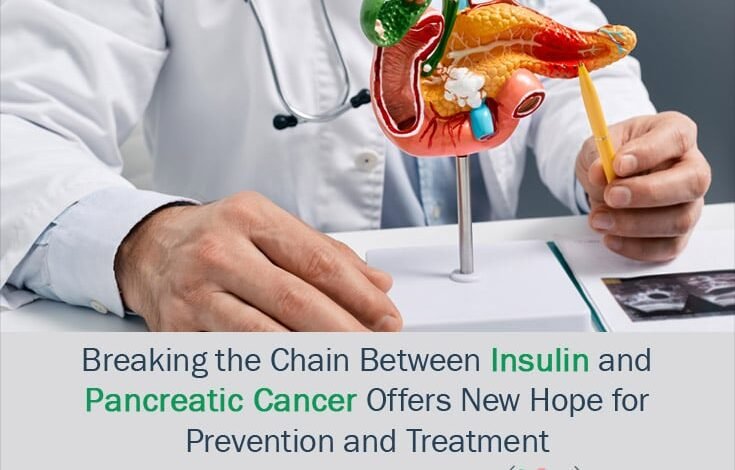Link Between Insulin, Obesity, and Pancreatic Cancer

and type 2 diabetes are more likely to develop pancreatic cancer. The study found that high insulin levels stimulate pancreatic acinar cells, which create digestive juices. Overstimulation causes
, which transforms these cells into precancerous cells.
“Alongside the rapid increase in both obesity and type 2 diabetes, we’re seeing an alarming rise in pancreatic cancer rates,” said co-senior author Dr. James Johnson, a professor in the Department of Cellular and Physiological Sciences and interim director of the Life Sciences Institute at UBC. “These findings help us understand how this is happening, and highlight the importance of keeping insulin levels within a healthy range, which can be accomplished with diet, exercise and in some cases medications.”
The study focused on pancreatic ductal adenocarcinoma (PDAC), the most common kind of pancreatic cancer and the most aggressive, with a five-year survival rate of fewer than 10%. Pancreatic cancer is becoming more common. PDAC is anticipated to be the second biggest cause of cancer-related fatalities by 2030.
High Insulin Levels Directly Linked to Pancreatic Cancer
Obesity and type 2 diabetes have previously been identified as risk factors for pancreatic cancer, but the precise mechanisms by which this occurred were unknown. This new research illuminates the involvement of insulin and its receptors in this process.
Advertisement
“We found that hyperinsulinemia directly contributes to pancreatic cancer initiation through insulin receptors in acinar cells,” said Dr. Anni Zhang, the study’s first author who recently graduated with their Ph.D. from UBC. “The mechanism involves increased production of digestive enzymes, leading to heightened pancreatic inflammation.”
How Insulin Leads to Pancreatic Cancer
While insulin is well known for its involvement in blood sugar regulation, this study emphasizes its importance in pancreatic acinar cells. The findings reveal that insulin helps these cells perform their normal purpose of creating digestive enzymes that break down fat-rich diets, but at high levels, it can unwittingly promote pancreatic inflammation and the growth of precancerous cells.
The discoveries could open the path for new cancer prevention and treatment strategies that target insulin receptors in acinar cells.
Modulating Insulin Receptors to Prevent Pancreatic Cancer
“We hope this work will change clinical practice and help advance lifestyle interventions that can lower the risk of pancreatic cancer in the general population,” said co-senior author Dr. Janel Kopp, assistant professor in the Department of Cellular and Physiological Sciences at UBC. “This research could also pave the way for targeted therapies that modulate insulin receptors to prevent or slow the progression of pancreatic cancer.”
The team has started a clinical trial with BC Cancer and the Pancreas Centre BC to help patients with PDAC control their blood sugar and circulating insulin levels with the help of an endocrinologist. The findings, according to the researchers, may have ramifications for other malignancies associated with obesity and type 2 diabetes, where high insulin levels may potentially play a role in disease onset.
“Colleagues in Toronto have shown similar connections between insulin and breast cancer,” said Dr. Johnson. “In the future, we hope to determine whether and how excess insulin might contribute to other types of obesity- and diabetes-driven cancers.”
Reference :
- Hyperinsulinemia acts via acinar insulin receptors to initiate pancreatic cancer by increasing digestive enzyme production and inflammation – (https:www.sciencedirect.com/science/article/abs/pii/S1550413123003728?via%3Dihub)
Source: Medindia
Source link
#Link #Insulin #Obesity #Pancreatic #Cancer



